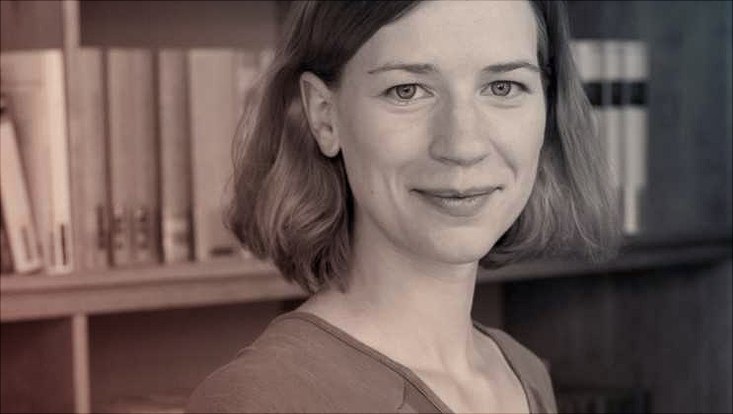Ines Gries, M.A.
Curriculum
Ines Gries studied comparative and German literature and aesthetics (interdisciplinary) at the Goethe University in Frankfurt, Germany, and at the University of Cambridge, England. She has taught since 2019 at Goethe University Frankfurt, where she explores the relations of Goethe’s metamorphosis and his ‘popular’ (i.e. ‘volkstümliches’) work for her dissertation [working title: Wissen – Volk – Literatur. Metamorphe Bildung in Goethes volkstümlicher Dichtung (Knowledge – People – Literature: metamorphic shaping in Goethe’s popular oeuvre)].
Publications (selection)
- „Goethes Märchen und seine Essays zur Spiraltendenz. Eine posthumanistische Lektüre“, in: Studia Germanica Posnaniensia XLII 2022 mit dem Themenschwerpunkt Ästhetiken des Posthumanen in Literatur und Medien (in review).
- „Tanzende Pflanzen. Eine posthumanistische Perspektive auf Goethes Kunstnatur“, in: TRANSPOSITIONES. Zeitschrift für transdisziplinäre und intermediale Kulturforschung mit dem Themenschwerpunkt Multiples Wissen. Lernen von/mit andern Entitäten. Vandenhoeck & Ruprecht 2022, pp. 65-84. Link to online issue: https://www.vr-elibrary.de/toc/trns/1/1.
Research topic: Potentiality of the accidental
From a side window in the Goethe's Garden House, Weimar, one can see the altar of Agathé Tyché, a large sphere on a cubic pedestal. This monument is emblematic of the basic conflict he negotiates in his studies of nature: the dispute between the regular and the irregular.
During my research stay in the summer of 2022, I will investigate the power of the accidental as an extreme form of the irregular. The accidental can be described equally as a force of nature and a force of art. We encounter the accidental in Goethe's Morphology in the second stanza (tyché) of his Urworte. Orphisch (Primordial words. Orphic) as well as in his metamorphosis of plants. In the latter, the accidental appears to be the force or drive of a specific progressive form. Above all, the accidental is characterized as a force that exposes what Goethe calls monstros (e.g. the proliferous rose). With his late essays on the spiral tendency (1831/32) it becomes clear that this relation between monstros and the accidental is an epistemological problem. Here, monstros occurs when the vertical tendency (“like an intellectual stick”) is missing, and the spiral tendency (“the actual producing principle of life”) operates in isolation – that is, where method and substance are out of balance.
In cultural history the accidental is primarily considered as a symptom of not knowing, i.e. it is something not inherent to the substance, but a limited perspective. According to that, Goethe's musical comedies are monstros, in which the "most random elements [...] were strung together by necessity". Analogous to a force of nature, which used to be held responsible for biological diversity (around 1800), the accidental appears to be a force of art, which counteracts any canonizing productions ("great significant representation"), and instead promotes oblique transformations ("lovers' theater").
Research results: Potentiality of the accidental
Goethe's concept of the accidental (or chance) is known as Týchē and is thematized in his work three times: as a garden monument in Weimar, as the second stanza of his poem „Urworte. Orphisch“, and third, in the „monstrous“ (the actual product of the metamorphosis that proceeds by chance).
Goethe uses the accidental as a metaphor for the potentiality of motion. This becomes particularly clear in the "monstrous", when Goethe ambivalently describes it for one as pathological, then again as a miraculous sign. It is not for the „monstrous“ itself (see for example the proliferous rose) that „Týchē“ serves as a metaphor for the potentiality of motion, but for the contemplation of said „monstrous“ object. The moving contemplation takes on the very specific form of „swaying“ between different options of valuation.
In the history of knowledge, the accidental is not only a proof for contingency but serves as a replacement for the (so far) inexplicable. In contrast to the numinous, the accidental always reflects its interim status as "not yet" and thus always reflects the current state of knowledge. Goethe's concept of the accidental extends this "not yet" into "or different", which reflects not only the interim status of one specific state of knowledge but rather the insufficiency of every (scientific) finding.

